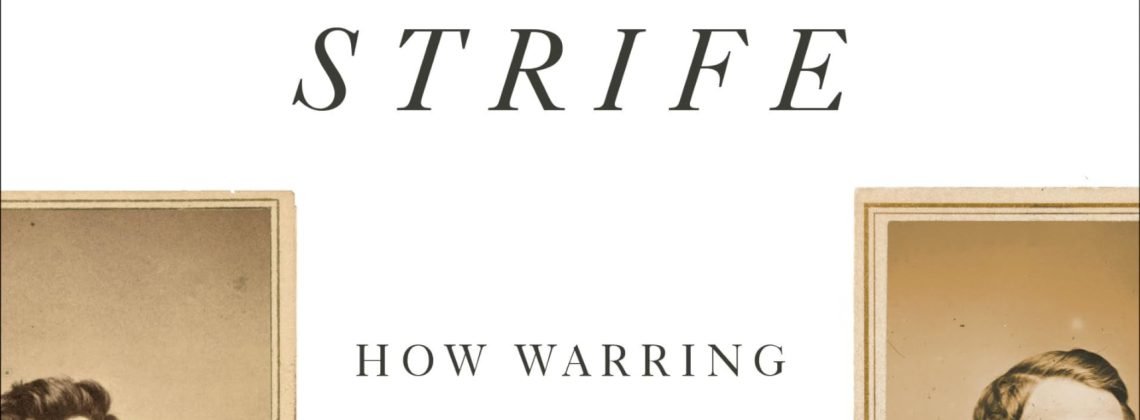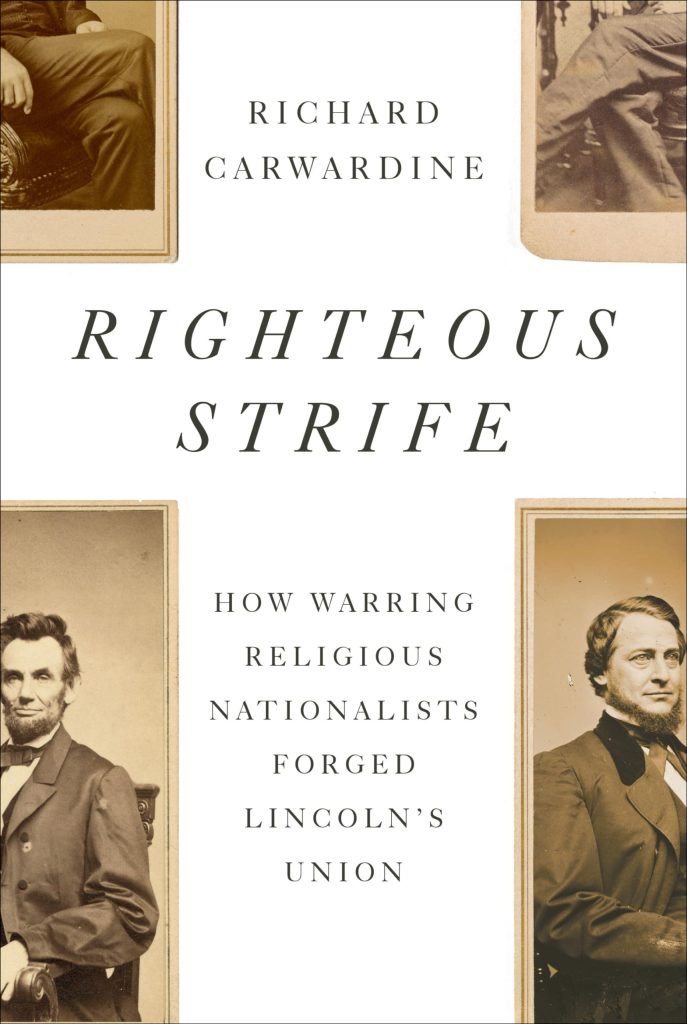

Richard Carwardine is Rhodes Professor of American History Emeritus and Distinguished Fellow at the Rothermere American Institute at the University of Oxford. This interview is based on his new book, Righteous Strife: How Warring Religious Nationalists Forged Lincoln’s Union (Knopf, 2025).
JF: What led you to write Righteous Strife?
RC: The book grew naturally out of my previous research and publications. My work on antebellum politics and religion, and continuing fascination with Abraham Lincoln, prompted the question: how did religious faith shape political conflict and mobilization during the Civil War? I began thinking about this for my Birkbeck Lectures (University of Cambridge, 2004) and turned them into a book proposal at the invitation of the publisher Alfred A. Knopf. Scholarly engagement with the Lincoln bicentenary and the Civil War sesquicentenary, and my book on Lincoln’s sense of humor, sidelined serious research for Righteous Strife until I retired from my academic posts at Oxford University. Knopf have been generously patient!
JF: In 2 sentences, what is the argument of Righteous Strife?
RC: The book argues that President Lincoln, moved during wartime to a new understanding of God’s role in history, harnessed the political power of devout antislavery Union loyalists who accepted him as the Almighty’s instrument for national redemption and mobilized to sustain him in office. But by pursuing emancipation and its corollaries, Lincoln fed the wrath of religious conservatives – an unstable coalition of War Democrats and Copperheads, sustained by a vociferous minority of Protestants and most Catholics – who clung to the pre-war constitutional order, denounced the “Puritan” tyrant, and fused religion and electoral politics as completely as did their Republican enemies.
JF: Why do we need to read Righteous Strife?
RC: Over recent decades landmark studies of the Civil War era have shown the importance of religion in molding ordinary lives, demonstrating that religious faith did not occupy a cultural silo but influenced ideas and behavior in the round. Despite this, studies of Union wartime politics have remained largely secular in focus. The neglect of the religious coals by which the iron of the new political nation was forged may perhaps reflect the largely secular mind of the academy and a belief that, when nineteenth-century politicians spoke with a religious voice, they simply decorated materialist and secular concerns with the rhetorical idioms of faith. That blind spot is striking and seriously compromises our view of this period of the American past.
Righteous Strife integrates the nationalist religion of the wartime Union, a polity drenched in faith, into a broad analytical narrative of its politics and electoral mobilization. In the political realm religious and secular imperatives drove ferocious conflict. Even those citizens who did not share the piety of the most devout engaged in an arena whose character reflected the intense moral clamor of the “political pulpit.” “Religion” bled into “politics,” and vice versa. The existential threat to the Union crystallized nationalist thinking. Citizens turned as much to the pulpit as to the political platform in their search for patriotic meaning, instruction, and solidarity. Church congregations cheered ministers’ sermons just as they would speakers on the political platform. Religious journals, newspapers, and addresses took political stands; political newspapers and election materials carried sermons and engaged in religious polemics. The interpenetration of politics and religion became the wartime norm.
Three themes dominate my book:
[1] Abraham Lincoln stands at the center of this story of the cultural swirl and political milieu of Civil War religion. The crisis reshaped his own religious thinking, just as what he said about faith encouraged others to reflect on the Almighty’s purposes. The profound trauma of war gave him a new perception of God, whom he came to see as an active force in history. This “providentialist turn” deepened the antislavery ethic that had animated his political speeches during the 1850s. Then, the beneficiaries of his Republican program to contain the wrong of slavery were to be the white settlers of the free-soil territories; now, a more capacious moral framework led him to embrace emancipation, “a new birth of freedom,” and equality of civic opportunity for both black and white. During the national mobilization for four bloody years of war, Lincoln articulated religious interpretations of the nation’s purpose, proclaiming an unprecedented number of days of national fasting (3) and thanksgiving (6). He acknowledged a God of history who shaped His purposes through the agency of nations. Notions of national wrongdoing, penitence, and redemption were regular aspects of his meetings with religious deputations, conversations with the devout, and correspondence from a rich cross-section of opinion. Cumulatively this led many to celebrate—and even revere—him as a moral and even Christian hero; others condemned him as a malign and diabolical influence on the country’s ethical course.
[2] The Union politics of the CW era were in essence a clash of opposing religious nationalisms. As antislavery nationalists grew in vigor and reach, so a corresponding force of conservative religious nationalists flexed their ideological muscles. Proponents of each drew on religious sanction, social identities, and political arguments that had been central to pre-war cultural conflicts but were now hardened and intensified through the crucible of war. Denominational labels in themselves offered no definitive guide. But powerful religious values and sensibilities shaped these two divergent nationalist imperatives.
The ideology and organizational power of antislavery nationalists ministered to American citizens confident that the republic’s salient Christianity, material well-being, and democratic political system gave it a unique historical role under the direction of Providence. Religious antislavery men and women, both black and white, believed profoundly in the principles and values of 1776, which would prevail over the ideology and practice of enslavement. Their millennialist faith—the conviction that the nation was progressing toward the day of Christ’s return and one-thousand year reign—sustained them through the suffering of war.
Conscientious abolitionists cast themselves as radical leaders in the struggle to purify the nation. Others of a more moderate temperament formed the core of a swelling army of crusaders pressing Lincoln to advance toward and beyond emancipation. Predominantly Protestant in faith, they commonly defined their purposes in biblical terms: a specially chosen people, the citizens of the young country had a duty to apply the prophetic wisdom of the Old Testament and Christ himself by expunging the nation’s greatest sin. As Republican and Union party activists and voters, they urged the administration from the early months of the war to support military boldness against rebel slaveholders; to bring freedom’s benefits to those slaves escaping over the advancing Federal lines; to cultivate support for emancipation in the loyal border slave states; and to choke slavery in those parts of the Confederacy returning to Union control. Only a distinct minority of white abolitionists shared the goal of complete racial equality that animated African American activists, but common to the mobilizing of all antislavery nationalists was moral outrage over the sinfulness, injustice, and social evil of enslavement. The fires of Christian conscience and transcendent purpose gave to Lincoln’s Union party a missionary dimension that in 1864 produced an almost complete fusion of Protestant piety and political passion.
[3] Conservative religious nationalists, no less wedded to the Union, instinctively clung to maintaining unimpaired the rights of the slaveholding states. Their talismanic principles honored the sovereignty of the family, white manliness, localism, the foundational rights and liberties of the states, and resistance to autocratic and theocratic “puritan” centralism. However, time and events exposed underlying fault lines within conservative Unionism and the Democratic party that embodied it. Some religious conservatives like Charles Hodge and William Gannaway Brownlow came to embrace emancipation as the necessary price of national survival; others, equally wedded to a military victory, fixed on retaining the key elements of the antebellum racial order; and yet others pleaded for an armistice and peace negotiations with apparently invincible Confederates. Compared with the broad unity of antislavery nationalists, religious conservatives presented a more diverse and fragmented coalition. Quite apart from the tension between war-supporting Democrats and the growing body of the party’s peace-advocating “Copperhead” dissenters, conservative nationalists comprised Catholic and Protestant religious traditions uneasily yoked in common purpose. As the “universal church,” Catholics were less invested in the notion of a transcendent American providentialism than their Protestant counterparts. The nationalist amalgam of these conservative faiths lacked the political coherence to achieve more than the sum of its parts. Yet the Democrats in 1864 still took 45 percent of the vote. Foregrounding race, emancipation, and political “despotism,” they pressed these issues with a battery of conservative religious and ethical arguments. As furious opponents of the “Puritan fanatics” they held responsible for the bloody course of the war, they cast themselves as moral exemplars utterly mystified that any sound Christian should fall for what they judged the unscriptural nonsense spouted by the abolitionists.
Many feared that these differences weakened the Union. In practice, however, they mostly broadened and sustained the nation’s wartime determination and persisting sense of invincibility.
JF: Tell us about the kinds of sources that you used for this book.
RC: There is an almost inexhaustible abundance of contemporary printed sources. I profited from the vast array of party political and religious newspapers. I dug into hundreds of political speeches, polemical tracts and sermons, as well as personal journals, letters, diaries, and denominational minutes and church reports. I also learnt a lot from political cartoons and satirical works.
Important collections of politicians’ and religious leaders’ manuscripts included the Lincoln Papers at the Library of Congress, especially valuable for incoming correspondence and petitions, and the Charles Hodge Papers at Princeton. I also made use of Civil War soldiers’ letters and journals, notably those held at the Henry E. Huntington Library (San Marino), and the Gilder Lehrman Collection, Morgan Library, New York.
JF: What is your next project?
RC: I am still pondering possibilities, but I’m drawn to exploring the character, purpose, and appeal of works written by the key political satirists of the Civil War era. This promises a little light (but meaningful) relief, after the avalanche of earnest rhetoric that informed Righteous Strife!
JF: Thanks, Richard!